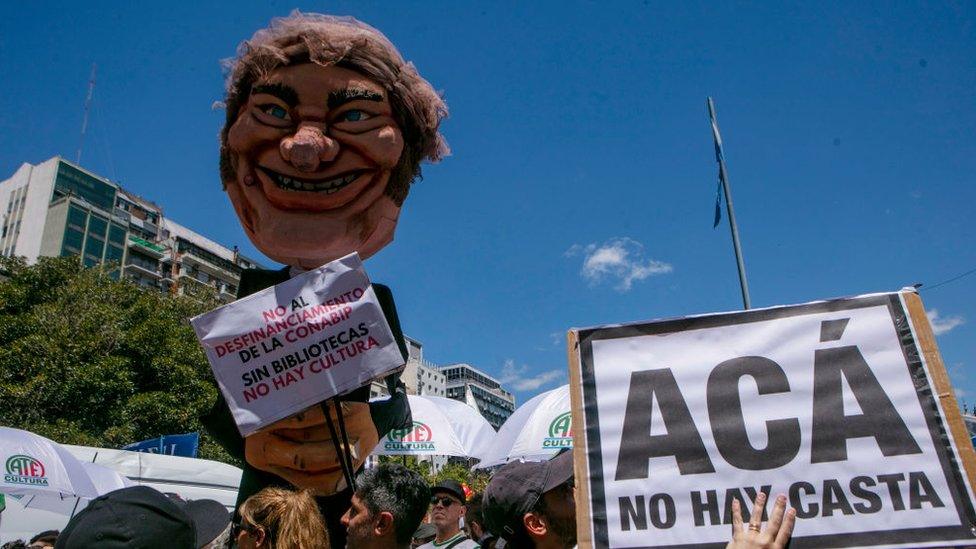Javier Milei: Protests as lawmakers debate reforms supported by Argentine president
- Published

Police and protesters squared off outside Congress on Wednesday
Police clashed with protesters in the Argentine capital, Buenos Aires, on Wednesday as lawmakers discussed a controversial bill proposed by newly-elected president Javier Milei.
The "omnibus bill" contains hundreds of articles which - if passed - will usher in sweeping free-market reforms.
Mr Milei was elected in November on a promise to overhaul Argentina's crisis-hit economy and lower inflation.
But some of his proposals have met with strong opposition from some lawmakers.
Mr Milei has warned that unless radical reforms are implemented, Argentina would face "a social catastrophe of biblical proportions".
Read more about Argentina's economic crisis: 'We're the country of beef, but we can only afford chicken'
The annual inflation rate is at 211% - the highest in more than three decades. Over 40% of people live in poverty, according to the country's statistics office.
The bill as originally proposed by the president contained more than 650 articles. But in an attempt to gain the support of the opposition, which has a majority in the lower house, it has since has been whittled down considerably.
The proposals which were dropped include an overhaul of the tax system and a proposal to change the way pensions are calculated.
And while the bill still proposes the privatisation of a number of state-run companies, oil giant YPF is no longer among them.
But a provision which would grant President Milei special emergency powers - allowing him to take decisions without consulting Congress on a number of matters, including economics and security - is still part of the proposed legislation, although the length has been halved from two years to one.
Critics of the bill say it would undermine Argentina's democracy. But President Milei argues that the country needs "shock therapy" if it is to recover from the economic crisis it has been mired in for years.

Javier Milei was voted in with a wide margin, winning more than 55% of the votes in a run-off
When he sent the bill to Congress, Mr Milei said he and his government needed "the right tools" to combat the issues "at the root of the country's impoverishment".
And while many Argentines back his radical plans, some of his reforms have already stalled.
On Tuesday, a court ruled that the labour reforms Mr Milei had pushed through by decree were unconstitutional. The reforms had already been suspended following an earlier court ruling just weeks after the president had brought them in by decree.
The judges said that President Milei had overstepped his powers when he brought in the reforms without the approval of Congress.
The government can appeal against the decision but for now it appears focussed on getting approval for its omnibus bill.
The discussion in the lower house is due to continue on Thursday and is expected to take many more hours.
If approved, it will then face scrutiny and another vote in the Senate.
Related topics
- Published24 January 2024

- Published29 December 2023

- Published11 December 2023
